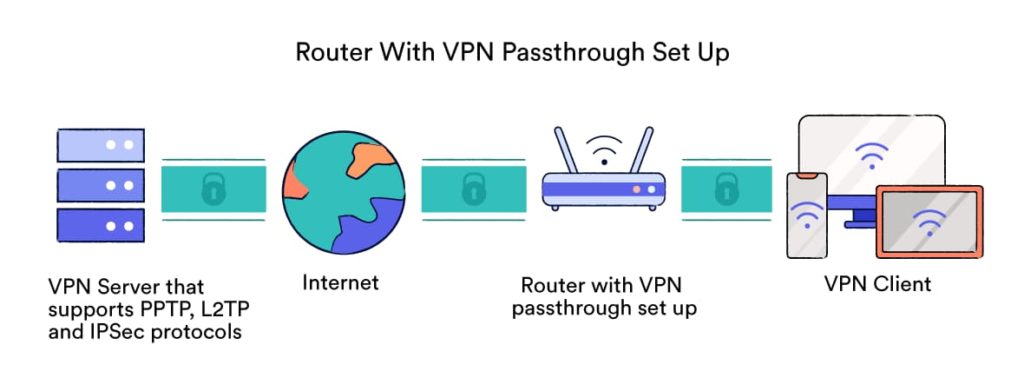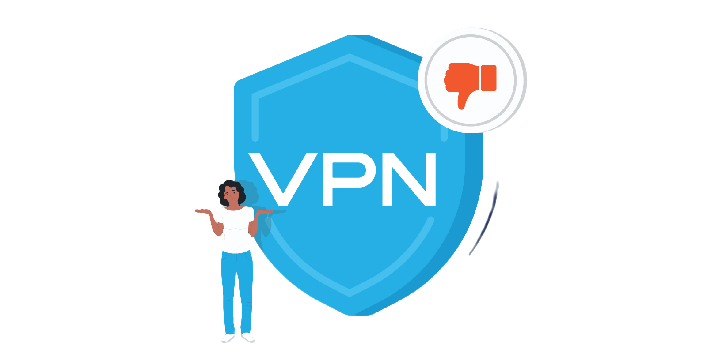What is VPN passthrough? [2023]
Last updated on July 12th, 2023 in VPN

Are you tired of being restricted online? Want to access geo-blocked content, protect your privacy, and enhance your security while browsing the internet? If so, then VPN passthrough might just be the solution you’ve been looking for.
In this blog post, we’ll dive into what VPN passthrough is all about and how it can benefit you. Whether you’re a tech-savvy individual or someone who’s new to the world of virtual private networks (VPNs), we’ve got you covered!
So let’s get started and unlock a whole new level of online freedom with VPN passthrough!
What is VPN passthrough? It’s a feature that allows you to use a VPN connection with devices connected to your home network. But what does that mean exactly?
Let’s break it down. When you connect to the internet, your data is transmitted through your ISP (Internet Service Provider). This means that everything you do online can be monitored and tracked by various parties, including hackers and government agencies.
A virtual private network (VPN) acts as a shield, encrypting your internet traffic and routing it through secure servers located in different parts of the world. This not only protects your sensitive information but also enables you to access region-restricted content.
So where does VPN passthrough come into play? Well, some routers or firewalls have built-in security measures that can interfere with VPN connections. That’s where VPN passthrough steps in – it allows the VPN traffic to pass through these obstacles seamlessly.
In simpler terms, think of VPN passthrough as a VIP pass for your data packets. It ensures that they can travel freely between your devices and the server running the VPN software without any hiccups or disruptions along the way.
Now that we’ve covered what VPN passthrough is all about, let’s explore how it actually works!
 VPN passthrough is a feature that allows you to connect multiple devices behind a router or firewall to a virtual private network (VPN) without any extra configuration. Essentially, it “passes through” the VPN traffic from your devices to the VPN server.
VPN passthrough is a feature that allows you to connect multiple devices behind a router or firewall to a virtual private network (VPN) without any extra configuration. Essentially, it “passes through” the VPN traffic from your devices to the VPN server.
When you establish a VPN connection, your data is encrypted and sent through a secure tunnel to the VPN server. Without VPN passthrough, routers or firewalls can block this encrypted traffic, preventing your devices from connecting to the VPN.
With VPN passthrough enabled on your router or firewall, it recognizes and allows the encapsulated packets of data associated with the specific type of VPN protocol used by your device. This ensures that all traffic related to the established VPN connection is allowed to pass through without being blocked.
The most common types of protocols supported by VPN passthrough are PPTP (Point-to-Point Tunneling Protocol), L2TP/IPSec (Layer 2 Tunneling Protocol/Internet Protocol Security), and IPSec (Internet Protocol Security).
By enabling this feature, you can ensure seamless connectivity between your devices and the remote network while maintaining privacy and security provided by the encrypted tunnel created by your chosen VPN protocol.

VPN passthrough offers several advantages for users who want to maintain a secure and private internet connection. One of the main benefits is the ability to seamlessly connect multiple devices within a network to a VPN server without any complications or interruptions.
By enabling VPN passthrough, you can ensure that all your devices, such as smartphones, tablets, laptops, and gaming consoles, are protected by the encryption and anonymity provided by the VPN. This means that whether you’re browsing the web, streaming content, or accessing sensitive information online, your data remains shielded from prying eyes.
Another benefit of using VPN passthrough is its compatibility with various types of protocols.
Whether you prefer OpenVPN, L2TP/IPsec, or PPTP protocols for your VPN connections, most routers with built-in support for passthrough allow seamless integration with these popular options.
Moreover, having a router with enabled VPN passthrough allows you to extend the protection across all devices connected to your home network. This means that even if some devices do not have native support for running a VPN client directly on them (like smart TVs), they can still enjoy encrypted connections through the router’s pass-through feature.
In addition to enhanced security and privacy measures offered by utilizing this feature in your router settings, another advantage is improved access to geo-restricted content. By connecting through a virtual location provided by your chosen VPN service provider while using pass-through functionality on your router device(s), you can bypass regional restrictions imposed on certain websites and streaming platforms.
This opens up new possibilities for accessing global content libraries and enjoying unrestricted internet freedom.
With these numerous benefits in mind – from increased device compatibility and extended protection across networks to unblocking restricted content – it’s clear why many users find value in setting up their routers with enabled VPN passthrough capability.
 While VPN passthrough can be a useful feature for certain situations, it does come with some downsides. One major drawback is that not all routers support VPN passthrough. This means that if you have an older or more basic router, you may not be able to take advantage of this feature.
While VPN passthrough can be a useful feature for certain situations, it does come with some downsides. One major drawback is that not all routers support VPN passthrough. This means that if you have an older or more basic router, you may not be able to take advantage of this feature.
Another potential issue is that enabling VPN passthrough can sometimes slow down your internet connection. The process of routing the VPN traffic through the router can add extra overhead and result in decreased speeds. If you rely on a fast and reliable internet connection for activities like streaming HD videos or online gaming, this slowdown may be noticeable and frustrating.
While enabling VPN passthrough allows external clients to establish secure connections through your router, it also creates potential security risks. If there are any vulnerabilities in your router’s firmware or configuration settings, they could potentially be exploited by malicious actors trying to gain unauthorized access.
This won’t happen on paid VPNs so we recommend getting a reputable VPN provider.
While there are benefits to using VPN passthrough, such as allowing external clients to securely connect through your home network, it’s important to consider these downsides before enabling this feature on your router. Make sure your router supports it and understand how it might impact performance and security before making a decision.
Setting up VPN passthrough is relatively simple and can be done by following a few straightforward steps. Here’s a quick guide on how to get started.
First, you’ll need to access your router’s settings. This can typically be done by typing in the router’s IP address into your web browser. Consult your router’s manual or manufacturer’s website for specific instructions on how to do this.
Once you’re in the settings, look for the section related to VPN passthrough. The location of this option may vary depending on your router model, but it is usually found under the “Security” or “Advanced” tabs.
Next, enable VPN passthrough by selecting the appropriate protocols that you want to allow through your router firewall. Common options include PPTP (Point-to-Point Tunneling Protocol), L2TP (Layer 2 Tunneling Protocol), and IPSec (Internet Protocol Security).
Save your changes and exit the settings menu. Your router will now allow VPN traffic to pass through its firewall without any issues.
Remember that setting up VPN passthrough may vary slightly depending on your specific router model. If you’re unsure about any step or encounter difficulties during the process, consult your router’s documentation or contact customer support for assistance.
Now that you have successfully set up VPN passthrough on your router, you can enjoy all the benefits of using a virtual private network securely across multiple devices connected to your network.
One of the major benefits of using a VPN (Virtual Private Network) is enhanced online security. When you connect to the internet through a VPN, all your data is encrypted and transmitted through a secure tunnel, protecting it from potential hackers or eavesdroppers. This is especially crucial when accessing sensitive information or conducting financial transactions online.
Another advantage of using a VPN is anonymity and privacy. By masking your IP address and routing your internet traffic through different servers around the world, a VPN allows you to browse the web anonymously. Your internet service provider (ISP), government agencies, or even websites cannot track your online activities or collect personal data.
Moreover, with a VPN, you can bypass geographic restrictions and access content that may be blocked in your region. Whether it’s streaming services like Netflix or websites restricted by censorship laws, a reliable VPN can give you unrestricted access to these platforms. This opens up new opportunities for entertainment and knowledge-sharing across borders.
Additionally, many businesses use VPNs to establish secure connections between remote employees and their corporate networks. This enables employees to work remotely without compromising on security while accessing company resources such as files, databases, or internal systems.
Furthermore, when connecting to public Wi-Fi networks such as those found in cafes or airports, using a VPN adds an extra layer of protection against potential threats lurking on these unsecured networks. It prevents unauthorized individuals from intercepting your data packets and gaining access to sensitive information like passwords or credit card details.
connect to the internet – whether at home or on-the-go – consider utilizing a trusted VPN service. This will ensure your privacy remains intact while enjoying all that the digital world has to offer!
HideIPVPN offers a VPN service with military-grade encryption, and high-speed servers with unlimited bandwidth.
Our service comes with shared IP addresses so that your activity can never be tied to one particular user, further protecting your privacy.

We also offer DNS leak protection, a Kill Switch, the latest VPN protocols, and a guaranteed no-log policy.
Every purchase you make comes with a 30-day money-back guarantee.
In today’s digital age, where online security and privacy have become paramount concerns, VPN passthrough serves as a valuable tool for ensuring secure connections. By allowing VPN traffic to pass through network devices like routers and firewalls, it enables users to maintain the benefits of using a VPN while still accessing local resources.
VPN passthrough works by transparently forwarding VPN packets from the internet to the connected device without interfering with its encryption or authentication. This seamless process ensures that your data remains protected and allows you to enjoy the advantages of using a VPN, such as bypassing geo-restrictions, safeguarding sensitive information, and maintaining anonymity online.
The key benefit of VPN passthrough is its ability to simultaneously support both remote access clients connecting via VPNs and local network communication. It eliminates any conflicts between these two types of traffic by intelligently routing them accordingly. This means that whether you’re working remotely or accessing resources within your private network, you can do so securely without sacrificing convenience or speed.
However, it’s important to note that there are some downsides to using VPN passthrough. One potential limitation is that not all routers or firewall devices support this feature. Before purchasing a new router or configuring your existing one for use with a VPN passthrough, make sure it explicitly supports this functionality. Additionally, some advanced features offered by certain VPN protocols may be restricted when using passthrough mode.
In conclusion,vpn-passthough provides an effective solution for seamlessly integrating virtual private networks into your existing network infrastructure.